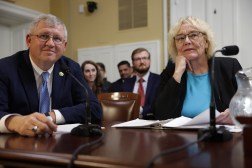White House fills out its quantum advisory committee

President Trump has appointed 21 members of the National Quantum Initiative Advisory Committee, almost a year after he signed the executive order creating the body, the White House said Friday.
Industry, university, national laboratory and federal agency experts make up the committee, which will counsel the White House Office of Science and Technology Policy on quantum information science (QIS) policy.
The Department of Energy was also involved in the member selection process.
“By organizing a way to harness our rapidly evolving quantum technologies, this committee will help transform and evolve applications for the future,” said Paul Dabbar, undersecretary for science at DOE, in the announcement.
Charles Tahan, director of the National Quantum Coordination Office, and Kathryn Ann Moler, dean of research at Stanford University, will co-chair the NQIAC, which will tentatively hold its first meeting in October.
Members include:
- Timothy Akers, assistant vice president for research innovation and accuracy at Morgan State University
- Frederic Chong, Seymour Goodman professor at the University of Chicago
- James Clarke, the director of quantum hardware at Intel Corporation
- Kai-Mei Fu, associate professor of physics and electrical and computer engineering at the University of Washington
- Marissa Giustina, senior research scientist at Google
- Gilbert Herrera, lab fellow at Sandia National Laboratories
- Evelyn Hu, Tarr-Coyne professor of electrical engineering and applied science at Harvard University
- Jungsang Kim, co-founder of IonQ
- Joseph Lykken, deputy director for research at Fermi National Accelerator Lab
- Luke Mauritsen, CEO of Montana Instruments
- Christopher Monroe, professor at the University of Maryland, College Park
- William Oliver, MIT-Lincoln lab fellow at the Massachusetts Institute of Technology
- Stephen Pawlowski, vice president of advanced computing solutions at Micron
- John Preskill, director of the Institute for Quantum and Matter at the California Institute of Technology
- Kristen Pudenz, lead for QIS at Lockheed Martin
- Chad Rigetti, CEO of Rigetti Computing
- Mark Ritter, chair of the Physical Sciences Council at IBM
- Robert Schoelkopf, Sterling professor of applied physics at Yale University
- Krysta Svore, general manager of quantum systems at Microsoft Research
- Jinliu Wang, senior vice chancellor for research and economic development at the State University of New York
- Jun Ye, adjoint professor of physics at the National Institute of Standards and Technology.
The committee was established by executive order in connection with the National Quantum Initiative Act of 2018, which also directed government to spend more than $1.2 billion over five years to advance QIS technology. About $625 million of that amount was allocated Wednesday for the creation of five DOE QIS Research Centers.
NQIAC will meet at least twice a year.
“We look forward to engaging with the entire U.S. innovation ecosystem to advance quantum research and innovation for the betterment of our nation,” said U.S. Chief Technology Officer Michael Kratsios in a statement.




